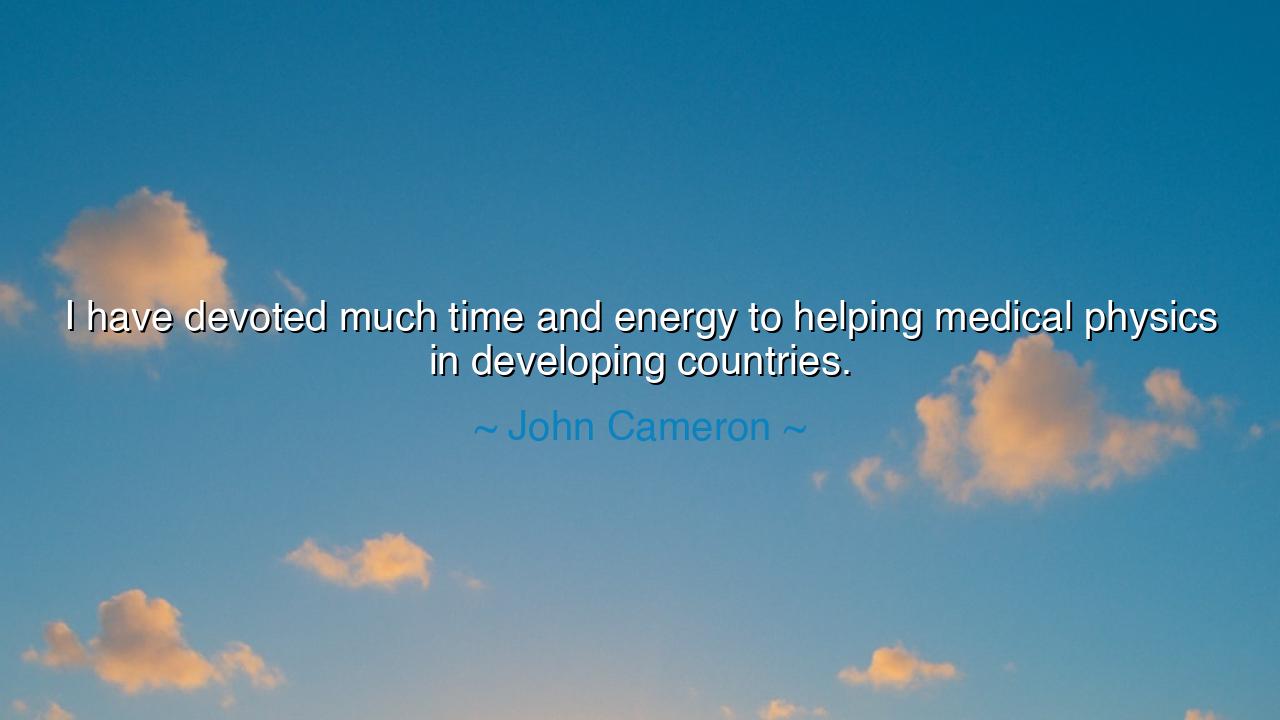
I have devoted much time and energy to helping medical physics in
I have devoted much time and energy to helping medical physics in developing countries.






Hearken to the words of John Cameron, whose reflection illuminates the enduring power of knowledge when shared across borders. He declares, “I have devoted much time and energy to helping medical physics in developing countries.” In these words lies a timeless truth: expertise is not a possession to hoard, but a gift to be extended, especially where it is most needed. True wisdom finds its highest purpose not in accumulation, but in the service of others, and in the alleviation of suffering across the far reaches of the world.
Since the dawn of civilization, healers and scholars have understood that knowledge attains its noblest expression when shared. In ancient Alexandria, the Library and its scholars were not merely a repository of learning, but a beacon for the wider world, guiding seekers from distant lands. Cameron’s words echo this ancient ethos: medical physics, like all forms of wisdom, becomes most potent when transmitted to those who would otherwise lack access to its insights, allowing science to heal where need is greatest.
Consider the story of Marie Curie, whose pioneering work in radioactivity transformed medicine and technology. Though her discoveries began in Europe, Curie’s influence spread globally, empowering generations of scientists and physicians in countries that had never before had access to such knowledge. Like Cameron, she devoted herself not only to research but to the dissemination of learning, ensuring that innovation became a tool for universal benefit rather than a treasure confined to the few.
Cameron’s reflection highlights the ethical dimension of expertise. To possess knowledge in medicine or physics is to carry a moral responsibility to deploy it where it will save lives and expand opportunity. Developing countries, often constrained by resources and infrastructure, stand to gain immeasurably from such engagement. By investing time and energy in these regions, Cameron exemplifies the principle that wisdom and skill are incomplete unless shared with those who can transform them into tangible benefit.
This endeavor also underscores the universality of human need. Disease, injury, and the quest for healing are not confined by geography, and knowledge is most honored when it bridges divides. Cameron’s commitment demonstrates that those who labor in the service of global health practice a form of heroism that transcends borders, echoing the ancient ideal of the physician and scholar as a servant to humanity itself.
The moral lesson emerges: true mastery is inseparable from service. Knowledge, no matter how advanced, achieves its highest value only when applied for the welfare of others. Cameron teaches that dedication to the underserved transforms individual effort into a legacy that resonates across communities and generations, fostering health, education, and hope where scarcity might otherwise prevail.
Practical guidance flows naturally: those who possess skill, education, or insight should seek opportunities to share it widely, particularly where resources are limited. Volunteer expertise, mentor, teach, and collaborate internationally or locally to ensure that knowledge benefits not just a few, but the many who lack access. By doing so, one transforms personal mastery into communal uplift, honoring both the craft and the human condition.
Thus, heed the wisdom of John Cameron: devote your gifts not solely to self or nation, but to the broader world, especially where need is greatest. In extending the reach of medical physics, one extends the reach of healing, hope, and humanity itself. Let expertise be a bridge across divides, and let service illuminate the highest purpose of knowledge, ensuring that learning becomes both a legacy and a lifeline for generations yet to come.






AAdministratorAdministrator
Welcome, honored guests. Please leave a comment, we will respond soon